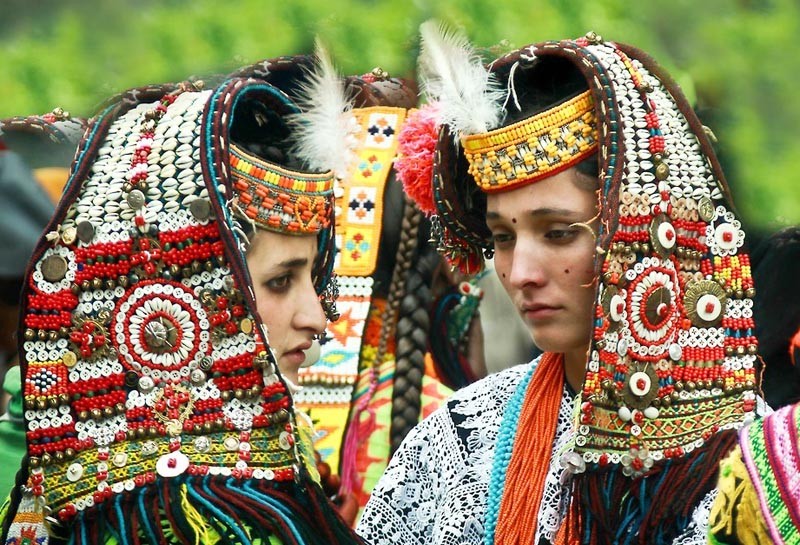
The key findings of the latest NCHR report do not augur very well for the future of this marginalised community

A recent report compiled by the National Commission for Human Rights (NCHR) on Kalash, an ethnic minority settled in the three valleys of Chitral -- Rumbur, Bumburet and Birir -- highlights the predicament of this marginalised community. The report states that their fundamental rights enshrined in the constitution are compromised, they are victims of land grabbing and religious intolerance, and are threatened by border incursions by Taliban into Chitral from Afghanistan.
It further states that forced conversions, poor socio-economic conditions and restrictions on performance of customs and rituals have suppressed this ethnic group over time to the point that they are gradually losing ownership of the famous silver oak forest, which is the main source of their livelihood.
Titled Saga of Survival: the protection, preservation and promotion of constitutional rights of indigenous Kalasha, it is the first in a series of reports on the country’s marginalised ethnic communities.
"This culture seems to be under a lot of pressure from an overwhelming non-Kalash population. Some of the immediate threats they face are forced religious conversions by being cajoled into marriages with non-Kalash," says Justice (r) Ali Nawaz Chohan, Chairman NCHR. "They feel particularly vulnerable because their society is open, women partake men in husbandry and all other day-to-day life chores."
Chohan says there’s a dire need to codify customary and marriage laws, and develop proper education and health facilities and road network "based on their culture and ethos".
The silver oak forest, which was part of the valley, has been gradually annexed to the government lands. Their landholdings are gradually reducing. A museum showcasing their history is severely neglected.
The community elders unanimously reject attempts to forcibly convert Kalash girls. The overall socio-economic and political conditions of the valley are influencing the decisions of some Kalash to abandon their religion and culture. Kalash elders also admitted that some Kalash women opt to marry Muslim men which results in their conversion. They are also deeply concerned about divorces of Kalash women immediately after their conversion and marriage to Muslim men without any social and financial arrangements for their sustenance.
The land settlement process in the three Kalash valleys is being carried out without involving the local people. The Kalash elders also fear encroachment on their lands by new Muslim settlers with the connivance of officials. Gradually, they are being deprived of their historical claim to ownership of silver oak forests in Kalash valleys granted to them by the Mehtar-e-Chitral about three centuries ago.
Kalash are particularly concerned about the lack of educational facilities. Their children cannot pursue college education in Chitral city due to poverty. They don’t have extended families in other cities. Kalash elders demand special quota for admissions in educational institutions. Locally, they are taught Islamic studies instead of their customs and ethics.
Further, in violation to their constitutional rights and cultural practices, Kalash are no longer able to hold their funerals and maintain graveyards. The ritual of open coffin can no longer be practiced due to the continued vandalism and desecration of the coffins. The traditional wheat harvest festival of Ratnat in summer has not been held in the past 10 years due to threats from the religious extremists.
Many people of the valley decline to comment on the issue of conversion, religious freedom and presence of Islamic extremist groups. "The population of the three valleys has been gradually rising. There are around 12,000 people in these valleys now. Out of them around 4,000 are Kalash while many have emigrated from Nuristan, Afghanistan. The majority of population is now Muslim," Luke Rehmat, a young Kalash, who helped in the study, tells TNS.
Regarding religious freedom, he says, people can easily judge when they visit the area.
National History and Literary Heritage Division (NHLD) in 2017 accepted the nomination of Kalash practice of Suri Jagek on the UNESCO’s List of Intangible Cultural Heritage in Need of Urgent Safeguarding. Suri Jagek is a traditional Kalash metereological and astronomical (calendar) practice of observing the sun, moon, stars and shadows with respect to the local topography.
The NCHR has urged the federal and provincial authorities to ensure the provision of books and teachers of optional subjects other than Islamiyat, and take immediate administrative steps to deal with the key issues under the existing constitutional and legal provisions. The protection of legal and marital rights of the newly converted Kalash girls is a fundamental constitutional responsibility of the state and local administration.
The report stresses that the local administration must ensure that there is no element of coercion in such marriages.
"We believe that Kalash must be extended all the support required to protect their religious and cultural places. To maintain rich cultural diversity in the country, they need to be respected and treated with dignity," says Chohan, concluding that by improving communication infrastructure and accessibility to the area, Pakistan can make it a great tourist-friendly zone.